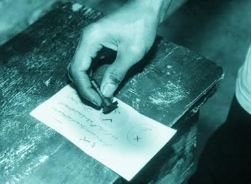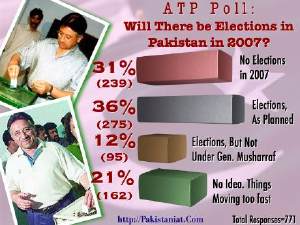 We are all aware of how our political parties are run by a few personalities without any regard for democratic principles. We also know how this seriously weakens the parties and impacts their ability to address the issues of the people and stand up to the establishment where needed.
We are all aware of how our political parties are run by a few personalities without any regard for democratic principles. We also know how this seriously weakens the parties and impacts their ability to address the issues of the people and stand up to the establishment where needed.
Even now, while most of the party workers of PPP are against any deal, BB is having talks with Musharraf in sheer disregard of the majority opinion in her party. Many opportunistic politicians are holding negotiations for tickets with more than one party without any commitment to any ideology or manifesto. All this naturally undermines the political process and prevents it from having much relevance to the people at the grass roots level.
While the events of the last few years have convinced many that military rule is not a solution to Pakistan’s problems, it is equally true that the political system, as it stands, is in need of a major overhaul. Most Pakistanis feel a complete disconnect between politics and how it impacts their lives. They are either indifferent or jubilant when the military takes over, hoping that perhaps the new ruler will turn out to be better. If the people are to have confidence in the political process, it must give them a genuine sense of participation.
It is not enough to say that the system will automatically sort itself out if allowed enough time sans interference from the military. This view is like the trickle down theory of economics, which says that given enough time, the benefits of economic growth will automatically filter down to the masses. While both trickle down theories may be strictly correct and good for a drawing room discussion, the suffering people can not and should not be made to wait so long. They can not be expected to come out in protest against a military coup when all the political system has to offer them is a vague promise of a trickle down effect some time in the far future.
Concrete steps are needed for making the political process reach out to the people at the grass roots level if the system is to function without any threat of derailment by the military. This should include steps for democratizing the party structure, genuine devolution of power to the lower level, free electronic media in the form of local radio and TV stations for openly debating grass roots issues, holding live debates on the manifestos of political parties rather than focusing on personalities, and putting in place solid checks and balances to prevent nepotism and corruption. Once such steps are taken, the political culture can start to change for the better in a noticeable way and the people can appreciate why the democratic process under the constitution is relevant to their well being.
 Unfortunately, the political parties are not interested in such reforms. Even the much hyped charter of democracy, (which did contain some constructive proposals on the independence of the judiciary, the election commission and the national accountability bureau) was lacking in any useful points on the above mentioned issues. And with Benazir’s negotiations with Musharraf for a deal, even this somewhat limited charter of democracy is now effectively dead.
Unfortunately, the political parties are not interested in such reforms. Even the much hyped charter of democracy, (which did contain some constructive proposals on the independence of the judiciary, the election commission and the national accountability bureau) was lacking in any useful points on the above mentioned issues. And with Benazir’s negotiations with Musharraf for a deal, even this somewhat limited charter of democracy is now effectively dead.
It is therefore left to the media and civil society to raise their voices for badly needed reforms aimed at making the political system genuinely participatory for the people. There are many issues worth struggling for, but as the polls approach, the focus for the next few months should be directed at reforms relating to the election process. In addition to the independence of the election commission, it is also very important to demand solid steps aimed at making the voters more aware and interested in manifestos rather than empty slogans on personalities (here and here), and having the parties put in place democratic and transparent processes for selecting their candidates.
 With that in mind, a campaign is being started for generating pressure on political parties to democratize the process for deciding party tickets. A set of suggestions has been drafted on how the process for party tickets can be made democratic and transparent and can be read here. The whole article is located here.
With that in mind, a campaign is being started for generating pressure on political parties to democratize the process for deciding party tickets. A set of suggestions has been drafted on how the process for party tickets can be made democratic and transparent and can be read here. The whole article is located here.
We are hoping to collect a large number of signatures from interested Pakistanis and gather their valuable input on improving these suggestions by Sunday, Aug 12.
After that, the resolution will be finalized and sent to political parties. This will be followed by aggressive marketing of the ideas to build pressure.
Your help is needed in the following four ways:
1. Leave a message of endorsement on the web page here.
2. Provide your valuable input to improve the suggested points or the campaign strategy by posting your comments on the above link.
3. Spread the word around and urge others to support the campaign.
4. Write letters to political parties, media and civil society groups on the subject and keep track of the issue by following up. Make sure that the issue is not allowed to go in the background over time.
It is about time that there was a serious effort to reform the political process to make personality politics, dictatorship within parties, and lotacracy obsolete. It is going to be a long struggle for the media and civil society to make that happen, but we need to start by raising our voices for appropriate reforms, and repeating them again, again and again in unison until it becomes impossible for vested interests to ignore them.






















































NS is coming as depicted by SC..4 bench…mood…
This was another very important post at ATP that seems to be just withering away thanks to the other energy and time consuming ‘living in the past’ and ‘mini’ posts.
My suggestion would be to keep the list to a minimum and achievable.
The one year proposal should be rethought as it would hinder the new faces entering politics.
The most powerful aspect of the suggestion is the live TV debates; let the media inform and present the representatives to the people and let the people make ‘well informed’ decisions.
The awareness in Pakistani civil society has increased by leaps and bounds in the last 8 years, especially in the last 4 months when the lava of hatred against corrupt and illegitimate military occupation burst.
Judiciary has gained independence in this process.
Most of the politicians are still caught in the yesteryears though. Amongst them are BB, Shujaat who are in a state of denial about the new ground realities. They want to stick to the old politics of 80s and 90s.
It is the lawyers who have mid-wifed the birth of a new Pakistani civil society. CJP’s defiance to the bully generals triggered the labor pains in the civil society. Muneer Malik and Ali Ahmad Kurd should join Aitzaz in politics. They’ll represent a a new breed of politicians.
Nawaz Sharif, Imran Khan, Javed Hashmi are no longer stuck in the 80s and 90s like BB. Their stance on army’s intervention in politics represents the feelings of the Pakistani nation on this issue.
The future belongs to parties who move forward and adapt a democratic culture within. Parties that are stuck in the politics of old will be shunned by the people.
I was hoping that by now, we would have gathered at least a couple of hundred signatures in favour of the campaign, but there are only a few so far. Where are your signatures ppl?
Come on everyone, it will take less than a minute of your time, please go
Here
and enter a message of support for the campaign. Something as short as “I agree” etc will also do, as long as you go there and put your name on it.
It will look very bad if the resolution goes to the political parties with only 10-20 signatures; it’s going to be an ongoing struggle even if there is a large number of endorsements, so please chip in with at least a signature and help in any of the 4 ways mentioned in the post.
PS:
Some of the above remarks deserve responses and I will get back for that later. For now, can everybody please please please leave their signatures?
Another issue that we need to seriously think about is campaign finance. Where does teh money come from? How is it spent?